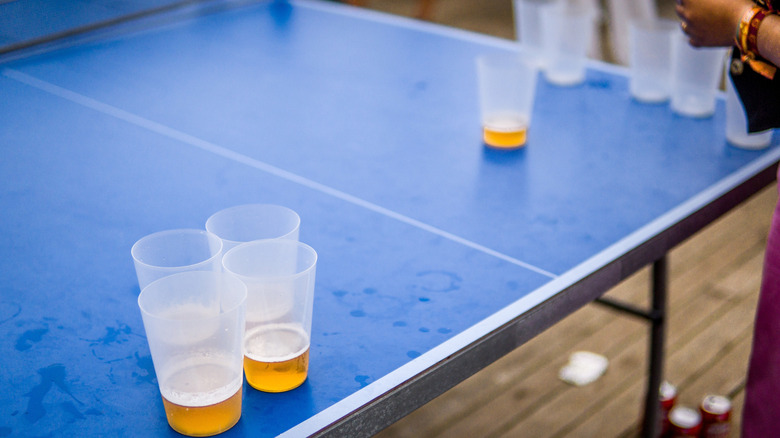If you’ve ever been to a frat party (or to college in general) or a sports tailgate, you’ve probably played a beer-based drinking game. Given its ubiquity, there’s a strong chance that game was beer pong, sometimes referred to simply as “pong” or confusingly, “Beirut.” Since the mid-20th century, barely-legal college students (and the young at heart) have been engaging in this storied beer drinking tradition that’s equal parts bonding and boozing, and it has even evolved into a serious tournament sport. While the basic objective of beer pong is simple — land a ping pong ball in your opponent’s cup, forcing them to drink its contents and remove it from the board — its origin story is anything but.
Most accounts trace the game’s genesis back to the hallowed fraternity basements of New Hampshire’s Dartmouth College. According to The Dartmouth Review, “the first reported game of pong was played in the mid-1950s,” though it didn’t gain widespread popularity until the 1970s. Legend says that the game was invented after students left cups of beer on a ping pong table and players began aiming for them with their paddles. Dartmouth students still honor this gameplay to this day. Most of the world, however, plays beer pong entirely paddle-less, with players instead tossing the ball across the table, though some consider this a different game entirely — the aforementioned Beirut. The origins of paddle-free beer pong are hotly contested, with different U.S. colleges and companies staking their claims to its legacy.
To paddle or not to paddle
Though most popular histories credit Dartmouth with the invention of the original, table tennis-esque game, it’s subsequent evolution into a throwing contest is much murkier. Alumni from Pennsylvania-based colleges Lehigh University and Bucknell University both claim to have been the first to chuck their paddles aside and rechristen the game “throw pong” or “Beirut,” supposedly in reference to U.S. involvement in the Lebanese Civil War in the 1980s. (For this name to make even the tiniest bit of sense, imagine that the pong balls are analogous to bombs.)
By the end of the 20th century, the game known as Beirut had become a college party staple, especially around the Northeast, but it took an entrepreneurial venture to turn the game from a clever way to use up a tapped keg of beer into a worldwide phenomenon. The World Series of Beer Pong (WSOBP) was launched in 2006 by the founders of BPONG.com, and in addition to legitimizing it as a sport, they also helped spread its popularity through branded game equipment and reclaimed the “beer pong” moniker.
Beyond the paddle versus no paddle question, there are many variations on the rules that make the game difficult to universally define. So, the next time you’re at a house party and you see teams tossing ping pong balls into cups of beer, should you call it beer pong or Beirut? That depends who you ask, but if you find yourself at Dartmouth College, expect to be shamed for playing without a paddle.






